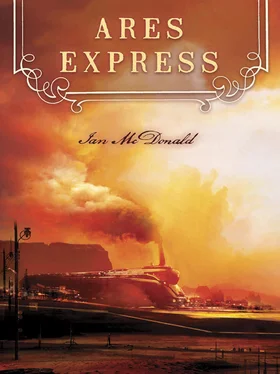“Mine,” the boy said.
“You think,” the girl laughed. “Way too old.”
“Is not.”
“Is too.”
“How old are you?” the boy asked Sweetness.
“Nearly-nine,” Sweetness said. “Listen…” But the girl gave a bray of laughter, stood up, arms folded triumphantly.
“Mine, see?”
“Too old for you, too, Meadowbank.”
“Me or no one else, Townley. And hadn’t you noticed, but she’s a girl anyway. My jurisdiction. Go back to your boys.”
The boy scowled. The girl play-pushed him away and squatted down in front of Sweetness.
“You came out of that flying thing, didn’t you?” she said. “I expect you hurt a bit.”
“A bit.” To name it brought it back. Sweetness lay back on the glass ceiling, feeling like glass inside; broken, sharp-edged bones of glass. The girl’s face eclipsed the sun.
“I’m Meadowbank Trumbden, President Elect of the Seven-Ups Girl Nation. You’ll be all right with me. Townley’s just a kid anyway and he knows he’s got no jurisdiction over girls. He was just trying it on because he thought you might have something worth stealing. They’d probably have eaten you. They’re not civilised, like we are, and they’ve got no idea how to manage things. We’re always having to lend them water or fix their runner. They can’t sail, you know. No sense of direction.”
Sweetness studied the face that bent over hers. The girl was a pinch-faced, sun-beaten urchin with bad skin and surprisingly well-cropped hair. She was dressed in a hooded parka and pocket-busy pants stitched from plastic sacks. Some of them still retained their logos. I am being rescued by someone who actually looks worse than me , Sweetness thought, ungraciously. She said, “Meadowbank Trumbden, I’m not feeling too good right now.”
Concern came over the gamine face.
“Oh, sorry sorry sorry. There’s me banging on again.” She put her fingers in her mouth and gave one of those piercing whistles that Sweetness had always wanted to be able to do and envied in those who could. She struggled up on to her elbows. It did not hurt quite so badly in this position, which gave her worries for her back. A half-dozen similarly dressed, similarly aged and similar-looking girls were working methodically across the roof glass, siphoning up ballast water with clearly home-brewed elbow pumps and storing it in arrays of plastic litrejohns on their backs. At Meadowbank Trumbden’s whistle, they abandoned their sweep and came hurrying to help. They moved with an odd gait, half lope, half skate.
“Got to get water when we can,” Meadowbank Trumbden explained.
A hundred or so metres beyond the water-gatherers were three singular artifacts. Like everything else Sweetness had seen of this hallucinatory roofworld—not much, she had to admit, but a significant sample—they were constructed chiefly from junk plastic. Availability of resources and idiosyncrasies of design resulted in wildly varying details but the underlying structure was the same, a hull, a cabin, booms and sails, riding the high, sheer glass on sharp-toed runners.
The water-huntresses obscured the view. Sweetness was ringed by faces.
“Hold tight,” Meadowbank Trumbden said. “This might hurt a bit.”
On three, the girls lifted Sweetness. It hurt a lot. They carried her to the closest of the glass schooners. The boy Townley watched from the poop of the smallest and meanest of the flotilla. He sniffed gooily. On the third and largest ship, a ferrety-looking eight-year-old boy was rigging canvas on two angled side-sails. He called over.
“Pass her over here when you’re done.”
“Keep your hormones to yourself, Draelon,” Meadowbank Trumbden returned. The watergirls gently handled Sweetness over the side. That hurt more. Meadowbank Trumbden had her brought up to a canopied deck at the rear and laid on a palliasse stuffed with shredded plastic. A deckhand offered Sweetness water. She sipped, then her body remembered how long it had been since it last drank and she grabbed the flagon and gulped greedily. Water splashed over her face, down her neck.
“Prie, take her out,” Meadowbank ordered.
Windlasses lifted land-anchors of solid glass. Sails were raised, a muscular girl in a sleeveless vest of white plastic took the rudder, a sweep of wood with a steel hook buried in the tip. Sweetness felt the ship stir as the eternal winds of Worldroof bellied the plastic sails. With a sharp screak of steel runners, the little fleet set forth, President Meadowbank’s barque taking point. In their wake, the schooners left three sets of parallel scores on the glass.
The Seven-Ups Girl Nation, President Elect Meadowbank Trumbden, had a population of eight and national boundaries at once as wide as the whole Worldroof (here it was floor, not ceiling) and as tightly circumscribed as the hull of their glass-cruiser. Each of the junk schooners—many more roamed the vastnesses of the glass desert, scavenging—was a separate people and state, delimited by age, sex and the availability of scarce resources. Townley Cheane, currently Chief of the Five-boys, ran an order of four-and five-year-olds with a piratical disposition and a taste for the cheerful monster-movie ghoulishness peculiar to boys of those ages. Each nation set its own laws and mores and jealously guarded its jurisdiction. If you survived to outgrow your nation, you graduated up to the next. Soon chubby Townley would make the short but significant crossing from Five-boys to Slayer , the third ship in the little fleet, and, after painful and humiliating hazing rituals, pass under the rule of King Draelon (the Temporary) and his hormone-tormented pubescents. Out there were nations of lofty girls with budding breasts and interests in make-up; there were shiploads of aggressive, boisterous male nearly-nines; there was even the Great Crèche where the semi-legendary Mam Mammary rocked cots of cotton-swaddled infants as she steered her pinnace across the high glass. All on Worldroof shared a greater nationhood: this was the place where the lost children went; the bad little boys who would not keep hold of their nannies’ hands in the big shops; the naughty girls who stamped their feet and would not come when told; the schoolchildren who wandered off from organised trips; the sulky teenagers who spent too long staring blackly out of the window of the Skywheel shuttle lounge and turned back to find family and luggage gone; the toddlers who got up on their feet and ran as fast as they could away from their fathers until they outran the world and ended up in that place that every society has, the place where the lost things go. Think of it as a kind of postal sorting office, with little marked cages for the pens and the socks and the cable remotes and the cuff-links; the cats and the change and the cigarette lighters. Children here, subsorted into age and sex and transported by the agents of lostness to their allotted place. Pens to a planetoid just inside the orbit of Neptune, change to a vast, red-hot volcanic vault deep under the doloritic core of Mount Olympus; children to Worldroof.
Or so Meadowbank Trumbden believed. She was in her fifth nation now; a semi-memory held fragmentary images of standing on a high balcony with an elegant woman in white, sun shining through a glass roof on an upturned face, a tall man in a long dark coat shaking her awake in the night, moonslight on a glass roof. She no longer trusted these visions. Memories have half-lives. Scabies, a ratty little sheet-mender infected by her name, knew exactly where she came from: a grim industrial High-ville three kilometres down Pier 188276 where twelve generations had grown up atmosphere-plant workers and enthusiastic amateur incests. She had climbed away from all that, climbed and climbed and climbed through places that would not welcome her or welcomed her only to do things worse than where she had come from, until she popped a hatch and found she was on top of the world. No mystery there. But the babies, the wains and the toddlers; the only other explanation was deliberate abandonment and people didn’t do things like that.
Читать дальше












